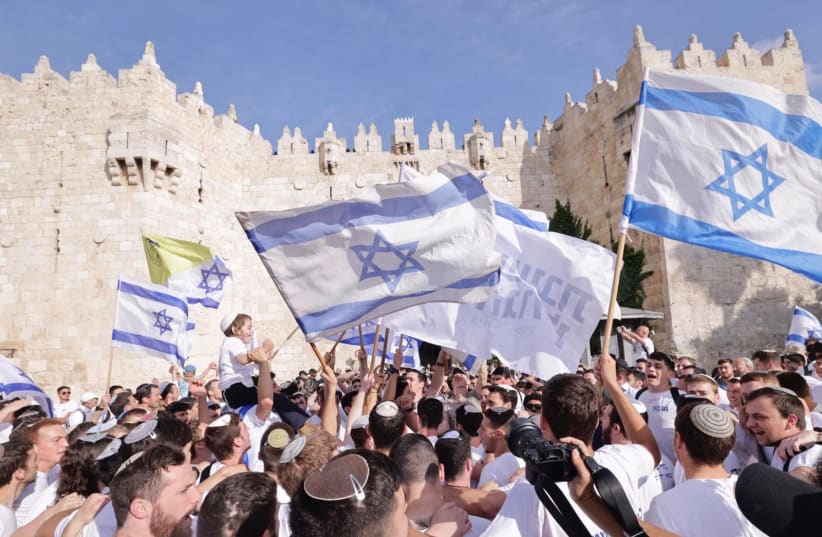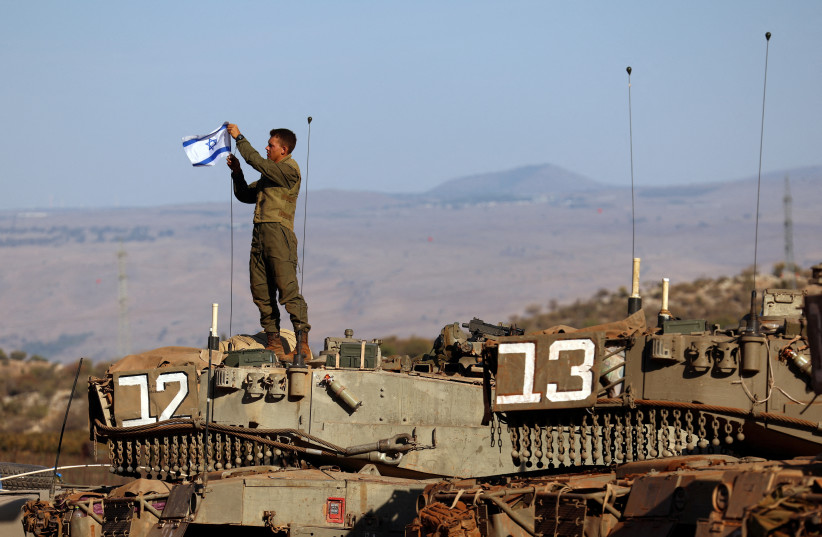October 7, 2023, marked a pivotal moment in Israeli history, comparable to the seismic impact of 9/11 in the USA. On that fateful day, the world changed irrevocably for every one of us. The Simchat Torah massacre shattered the illusions of security for many, ushering in a new reality that has left no facet of life untouched. In addition to the shattered dreams of peace and a redefined national identity, the shifting sands of security and the resurgence of global antisemitism have further complicated the landscape.
Political realization
For some, the new reality has shattered long-held beliefs and dreams of coexistence. Those who were once staunch advocates for a left-wing, pro-peace stance, championing the two-state solution, find themselves grappling with a shattered reality. The vision of Jews and Muslims cohabiting peacefully now appears as a distant mirage, broken into 1,200 pieces.
The Simchat Torah Massacre has challenged the foundations of these individuals’ political and ideological convictions. The utopian vision of harmony, where two distinct communities coexist in peace, seems elusive in the wake of the brutal events of that October day. The harsh reality of violence has forced a profound reassessment of long-standing beliefs.
Dissolving illusions of security
For those who believed in the invincibility of the Israeli Defense Forces and the inherent security of their homeland, the past 10 weeks have been a harsh awakening. The so-called strongest army in the Middle East is grappling with a formidable terrorist organization whose sophistication has taken even the most seasoned military analysts by surprise. The once steadfast belief in an impenetrable security blanket has dissolved into thin air, leaving Israelis to confront a harsh and uncertain reality.
The realization that existential threats are not only possible but can strike at the heart of the nation has shaken the core of Israeli security doctrine. The landscape, once characterized by sporadic skirmishes, is now marked by an ongoing struggle against a resilient adversary, prompting a fundamental reassessment of defense strategies and national preparedness.
Global antisemitism: A wake-up call
In the wake of the Simchat Torah massacre, another harsh reality has come to the forefront – the illusion that Jews in the Diaspora were immune from the age-old scourge of antisemitism has been shattered. University campuses have erupted with hatred for Jews, and marches worldwide resound with genocidal chants of “from the river to the sea.” The Diaspora, so recently seen as a haven of safety and tolerance, is now facing a resurgence of ancient prejudices that were thought (or at least hoped) to be relegated to history.
The chilling reality of antisemitic sentiments spreading globally underscores the interconnectedness of the Jewish experience. The idea that geographic distance could provide immunity from hatred has been dispelled, prompting Jews worldwide to confront the harsh truth that their identity remains a target for bigotry and discrimination. The aliyah offices are inundated with calls to open new files.
The secret to navigating new realities: Adaptability and purpose
In the face of these unprecedented challenges, the key to survival lies in adaptability and purpose. Sheryl Sandberg, in her seminal work Option B, emphasizes the need to accept that Option A is no longer available and to actively work on creating an Option B.
I suggest that there are four essential strategies, and one secret, inexplicable ingredient for learning to live with these new realities:
1. Building resilience: A preemptive exercise
Resilience is not a trait born out of crisis; rather, it is a muscle that needs to be developed during times of relative calm. The Israeli nation, perhaps because from the very day of its birth it had to fight for its life, has always been a resilient entity.
Now that we are facing a new and evolving threat landscape, we must prioritize the cultivation and strengthening of resilience. This involves fostering a mindset that embraces challenges as opportunities for growth, allowing individuals and communities to bounce back in the face of adversity. We have seen this resilience in every city, community, neighborhood and household, as we learn to cope with the daily tragedies of fallen heroes and murdered hostages. We get up, metaphorically brush ourselves off and get on with our lives.
2. Meaningfulness as a drive for life
After the Holocaust, there were those who chose to go back to their hometowns in Eastern Europe, hankering after the “good old days” where they lived in relative peace, if not harmony, with their gentile neighbors – these poor souls had their illusions and hopes shattered like the shards of the broken communities to which they had returned. They did not do well.
On the other hand, there were those who positively turned their back on the old ways and became a New Type of Jew, forging new lives in new places, often with new names and adapting to new customs. They fared much better.
But perhaps those who succeeded most in building or, to be more accurate, rebuilding their fractured lives, were the ones who, as Victor Frankel states, “found meaning in their existence.”
I recall an event from over 20 years ago which had a profound effect on me as an example of taking on meaning in a post-Holocaust reality.
I was asked to perform a brit milah (circumcision) on the newborn son of a rather famous football player. The grandfather of the baby was to be the sandek, who holds the baby for the ceremony.
As was my usual practice, I introduced myself to the prospective sandek and began to explain what he would need to do. I asked if he had been sandek before. He smiled and said “Yes, this will be my 17th time.” I was somewhat taken aback – 17 times a sandek – there must be a story behind this. This “professional” sandek, a thoroughly secular Jew, told me he was a Holocaust survivor, and he had made it his business to bring as many children into the Jewish covenant as possible. This was his defiant retort to Hitler and his henchmen. This drive had suffused his life with the meaning about which Frankel wrote so passionately.
3. Compassion in crisis: Supporting each other effectively
Effective communication and compassion are critical tools in navigating extreme stress. When the war is over, the psychological fall-out which is only just beginning, is going to be massive, deep, and disturbing. We will have to learn how to communicate with those under duress, offering support in ways that align with their individual needs. Empathy becomes a cornerstone for fostering unity and understanding, allowing for a collective response to shared challenges. We are all going to have to become expert counselors with tremendous patience. We will need to act with kindness and tolerance, especially toward those with different views to ourselves. Given the propensity for Israelis to fly off the handle – this will be a challenge.
4. Gratitude for the present: Embracing each moment
Living with new realities requires a conscious effort to appreciate both the small and significant aspects of life. Despite the challenges we undoubtedly are and will face, we must learn to find joy in each moment, acknowledging all the blessings we are afforded. Gratitude is a powerful antidote to despair, fostering a sense of resilience and hope in the face of uncertainty.
So, let’s not take for granted the small things, like a walk on the beach, a beautiful sunset, a hug from our soldier son or daughter home on leave for just a few precious hours, the smile of our innocent young grandchildren, who thank God, know nothing of the horrors of war. And let’s celebrate the big things – not like there is no tomorrow – because there is a tomorrow, just a very different one from today.
Yes, adapting to the new reality post – the Simchat Torah Massacre demands a collective commitment to resilience, compassion, and gratitude. We as a nation are navigating uncharted territory, confronting shattered illusions and unprecedented threats. Yet, with a spirit of adaptability and deep meaningfulness, we can forge a path forward, embracing the challenges as opportunities for growth and renewal. Through a united front, fortified by the dual weapons of compassion and gratitude, we will learn to navigate the complexities of our transformed world and build a sustainable Option B for the future.
The secret sauce
But there is that one secret ingredient, one that no other nation has, one that defies logic and flies in the face of all theories of survival, a fact about which historians have mused upon and scratched their collective heads for millennia.
It is summed up by a meme that was sent round various WhatsApp groups last week: “The more you hate us, the ‘Jewisher’ we get.”
Whatever being Jewish means to each individual, whether it be observance of Mitzvot, baking challah, making aliyah, solidarity with Israel, or just inexplicably “being” Jewish – our new reality somehow or other is upping our game. It is, perhaps this, more than anything else that will see us flourish again and adapt to the new world, stronger, wiser, and Jewisher.
Am Yisrael Chai.
The writer is a rabbi who lives in Ramat Poleg, Netanya, and is a cofounder of Techelet – Inspiring Judaism.

